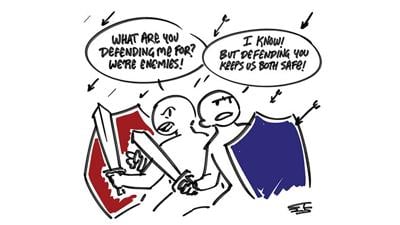One singular event in my youth forever changed how I think of freedom of expression.
I grew up in a small town and graduated high school in a class of 19 kids, most of whom started kindergarten with me. We spent nearly every minute of every school day together for 13 years. When someone moved into the area and enrolled in the school, the student’s somewhat unwelcoming classmates would call him or her “the new kid” for years.
One year, a boy in the grade above mine, Jamie, did the absolute unthinkable. He flunked. Not just one class, but all of them. Consequently, he had to repeat his seventh-grade year and became part of our class. It was absolute social suicide. Every friend he had moved on to eighth grade without him.
Our seventh-grade year was clearly not fun for Jamie, who basically was a social pariah among the new class he’d joined. Hardly anyone talked to him or invited him to hang out after school. He was a nice enough kid, if not academically motivated. He spent much more time scheming how to cheat on his homework than learning the material. But he managed to pass the seventh grade the second time around and moved into the eighth grade with us.
That brings me to student council elections of my eighth-grade year. Two boys offered to take up the mantle of class representative – Terry, a kind, happy, quiet, B student, and Jamie. It was the first time any of us had seen Jamie show any initiative.
The class sponsor asked the boys to step out into the hallway so the class could discuss the merits of each candidate without embarrassing them. Logically, Terry was the better choice. He was dependable and gave a good effort to anything he tried. Jamie was the type of person who showed up late and unprepared, if he bothered to show up at all.
But, many classmates expressed enthusiasm that Jamie was making even the tiniest effort to be involved in an extracurricular activity. Perhaps joining the student council would push him to take his academics more seriously. Others thought it would just be funny to have the worst student represent the entire class.
When it was time to vote, it was a tie between the two boys. I voted for Terry, who I thought deserved the position. After the first vote, the class sponsor told the class “It’s time to get serious. You all need to vote for Terry. You know Jamie is going to do a bad job. I’m going to be watching how everyone votes. If I see anybody vote for Jamie, there will be consequences. I am on the school scholarship committee, and I will make sure that anyone who votes for Jamie does not receive a single scholarship from this school when you graduate.”
My classmates and I sat there a bit stunned. Had she really threatened a bunch of eighth graders over a student council election? Hadn’t we just read about authoritarian dictators using similar tactics in our government class in the previous weeks? Surely I wasn’t the only one who had been paying attention to our social studies teacher.
Me, a somewhat insufferable know-it-all with a keen sense of injustice, piped up to inform the sponsor that she was in the wrong. “You’re not allowed to tell us who to vote for! We can vote for whoever we want!”
The sponsor reiterated how Terry was a better choice than Jamie, reminding us that Jamie had flunked into our class for being lazy and lacked the ambition to pass his classes, let alone take on additional responsibilities.
I replied that of course Terry was the better choice, but she still shouldn’t threaten us into voting for him. We had the right to pick the worse choice, if we wanted to. I looked around, waiting for any of my classmates to chime in and back me up, and while I saw a couple of nodding heads, the majority avoided my gaze.
The sponsor warned me that if I said anything else, I was going to the principal’s office. She then reiterated that anyone who voted for Jamie would face consequences.
When we took the second vote and she asked who was voting for Jamie, my stubborn hand, and mine alone, shot into the air.
“I’ll remember this,” the sponsor said before sending me to the office, the first and last time I was ever sent to see the principal in my life.
Fast forward four years, true to her word, despite being a straight-A student at the top of my class, playing on several varsity sports teams and taking part in other extracurricular activities, including student council, I did not receive a single scholarship from the school. Not that it mattered, as I earned a full academic scholarship to a university, but still.
As for Jamie, classmates told him what the teacher had said about him, and I guess that was the last straw for his educational career. A few weeks later he dropped out of school and I’ve never seen or heard from him again. I don’t know if he had had gotten the chance to serve as our representative would have changed his trajectory. Maybe he would have dropped out either way. But that certainly wasn’t the sponsor’s call to make.
I think about that day now and then and how easy it was for one authority figure to abuse her power to take away my classmates’ voices and how only one person bothered to object at all. I have often been disturbed to see how few people are willing to push back on leaders who try to threaten others into silence or compliance, and how even fewer people are willing to stand up for the rights of those with whom they disagree.
There’s a quote I have always admired: “I disapprove of what you say, but I will defend to the death your right to say it.”
People should be allowed to have opinions I think are stupid. People should be allowed to make choices I think are dumb. People should be allowed to loudly and proudly have political views that differ from my own. If people disagree with me, I want to convince them that my point of view is better, not simply silence them to get what I want.
Is it unwise to vote for the Jamies of the world? Probably so. But, should we have the freedom to do so without retaliation from those in power? Yes. Absolutely.




